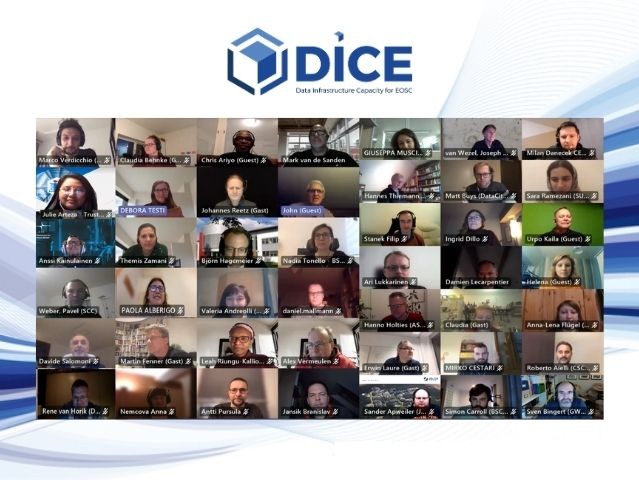An innovative research EU project in the EOSC framework - DICE - Data Infrastructure Capacity for EOSC
The main objective of DICE is to strengthen the EOSC initiative by supporting researchers with resources and state-of-the-art services for their multidisciplinary data management workflows: 14 different services are offered with a joint capacity of more than 50 Petabytes from a network of 18 providers across Europe. The offering coming through DICE consists not only of the services and the resources behind it, but also includes effort from technical staff at the provider side to enable and properly configure or customise the services for the target research workflow to be in line with the research community needs. DICE operates in a European landscape of developing research infrastructures, which often have ready-developed solutions and tools for managing their data. The goal of the project is not to replace these infrastructures, but to support and enrich them by providing strong underlying components and generic services on which they can rely to build up their data strategy and e-infrastructure capacity. Debora Testi, Project Manager at CINECA, Member of the Board of Directors of PRACE and DICE Project Coordinator, states that DICE’s strength lies in the connections between major scientific data centres, the resilience resulting from the geographically distributed network, but also in its ability to store research data right alongside some of the most powerful supercomputers in Europe and to ensure fast connectivity between the sites. “I am really enthusiastic and honoured to lead this consortium to enrich EOSC with advanced data management services and resources”, she says. What challenges does DICE face in the months ahead? Via the Virtual Access (VA) mechanism, DICE will make large volumes of storage capacity available for communities to store research data for mid and long-term duration. Additionally, DICE partners will provide tools and different mechanisms to support efficient data transfers from where the data is being generated and processed, and needs to be stored and made available to the researcher. DICE aims to demonstrate the effectiveness of the data services offered by the project through EOSC by integrating them with community platforms, consolidating the collaboration with communities already within EUDAT and engaging with new communities coming through EOSC. For this reason, research communities will be closely associated with the exploitation of the services. DICE begins with a solid bedrock of more than 25 research communities (including nine ESFRI communities) in the areas of social sciences and humanities, earth and atmospheric science, climate science, biodiversity, life sciences, and physics. What kind of services will be offered? The services offered through DICE provide solutions for Research Infrastructures, service providers, research teams and individual researchers, and citizen scientists to support them in every step of the research data lifecycle. - Personal/project workspaces, containing different kinds of data services used by researchers and research teams when doing active research and when data is not yet stable. - Data archives, containing high volume cost-efficient data services in which bit preservation level durability is ensured. These kinds of services are often used to safely store data to bridge projects and/or computing grants. - Policy-based data archives, a service category that offers services with the capability for advanced data management practices on the basis of policies. - Data repository, gathering services allowing communities to easily implement a FAIR digital repository in which research data can be maintained and preserved for long-term. - Data discovery, a category of services via which research data are made discoverable from many different communities and scientific disciplines to support cross-disciplinary research.



